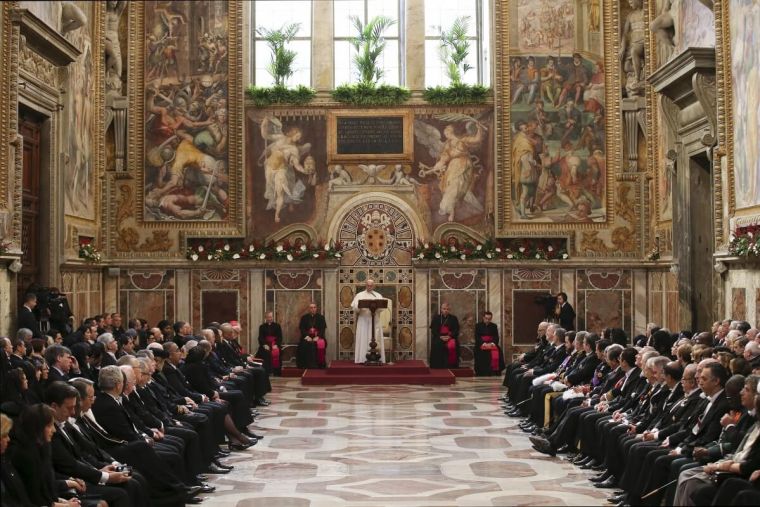Pope Francis: All true religion leads to peace
People of God must be men and women of peace, and it's possible for followers of different faiths to co-exist peacefully, Pope Francis said yesterday.
Speaking at a gathering of global diplomats during a New Year's address at the Apostolic Palace in the Vatican, the Pope said, "Every authentic practice of religion cannot fail to promote peace."

In his address, the Pope tackled issues at the forefront of the international agenda, including the refugee crisis and religious extremism within the context of the Catholic Jubilee Year of Mercy.
Using the examples of the legal ratification of the Catholic Church in Chad and Palestine, Francis insisted that "peaceful co-existence between the followers of different religions is possible when religious freedom is recognised and practical cooperation in the pursuit of the common good, in a spirit of respect for the cultural identity of all parties, is effectively guaranteed."
The incarnation, he said, serves as a reminder of "the real face of God, for whom power does not mean force or destruction but love, and for whom justice is not vengeance but mercy."
Pope Francis also reaffirmed, alongside the Muslim community of the Central African Republic, that "those who claim to believe in God must also be men and women of peace and consequently of mercy, for one may never kill in the name of God."
He emphatically stated that "only a distorted ideological form of religion can think that justice is done in the name of the Almighty by deliberately slaughtering defenceless persons, as in the brutal terrorist attacks which occurred in recent months in Africa, Europe and the Middle East."
Speaking of the migration and refugee crisis, he remarked that it is crucial not to overlook the cultural implications of seeking to integrate those from different cultures.
Far from promoting the context for peace and tolerance, Francis warned that the relativism so present in the West provides the conditions for extremism to flourish.
"Extremism and fundamentalism find fertile soil not only in the exploitation of religion for purposes of power, but also in the vacuum of ideals and the loss of identity – including religious identity – which dramatically marks the so-called West," he said.
"This vacuum gives rise to the fear which leads to seeing the other as a threat and an enemy, to closed-mindedness and intransigence in defending preconceived notion."
Denouncing the "individualistic spirit" of the West, he named the greatest challenge facing us as "that of overcoming indifference and working together for peace, which remains a good which must constantly be sought."
"Persons are no longer seen as a paramount value to be cared for and respected," he said, "especially when poor or disabled, or 'not yet useful' – like the unborn – or 'no longer needed' – like the elderly."
Many of the issues that caused the migration crisis "could have been addressed some time ago" the Pope added, but it would have required "rethinking entrenched habits and practices" of the West, such as resource allocation and the arms trade.
He then reaffirmed the Holy See's "commitment in the ecumenical and interreligious sectors to inaugurating a sincere and respectful dialogue which, by valuing the distinctness and identity of each individual, can foster a harmonious coexistence among all the members of society."











